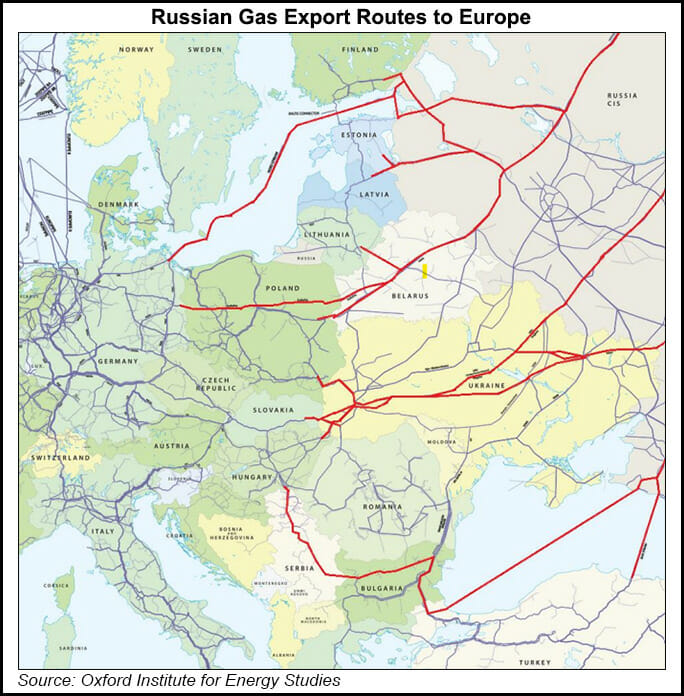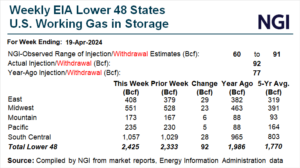Infrastructure | LNG Insight | Markets | NGI All News Access | NGI The Weekly Gas Market Report
Ukraine Warns of Threat to European Natural Gas as Russian Forces Near Compressor Stations
Ukraine’s natural gas transmission system operator (GTSOU) said Thursday Russian forces had entered its facilities, warning that natural gas transport to Europe could be threatened.

GTSOU said the Russian military had advanced to compressor stations in the Luhansk and Kharkiv regions.
“The company emphasizes that interference in the technological processes of the GTS creates significant risks to the safety of continuous gas transportation to consumers in Ukraine and Europe and can lead to a technological catastrophe in the region,” GTSOU said.
The operator said it reported “the emergency” to law enforcement agencies, Ukrainian authorities and Russia’s Gazprom PJSC. GTSOU had said Tuesday 32 gas distribution stations in the country were offline because of the Russian incursion, which impacted domestic supplies.
Europe imported about 45% of its natural gas from Russia last year, according to the European Commission. A portion of those volumes moves through Ukraine.
The market has been on edge since Russia invaded Ukraine last month over the possibility that intense fighting could damage transit routes or that the West could impose sanctions on Russian gas exports.
Despite the conflict, Russian flows making their way toward Europe have appeared to be strong. Gazprom said Thursday its flows through Ukraine were stable at more than 100 million cubic meters, or in line with its transit contract. Earlier this week, however, Russian officials said they wouldn’t rule out halting gas exports in relation to the West’s economic sanctions.
European natural gas prices dipped Thursday on a combination of factors, including profit taking and demand destruction, as some manufacturers have limited output on surging prices, along with the absence of sanctions on Russian gas exports.
The benchmark Title Transfer Facility has been volatile since the conflict erupted. The prompt contract shed more than $30 Thursday to finish near $41/MMBtu.
“There have been no European sanctions on Russian energy imports yet, while Russia consequently also looks less likely to stop gas flows, leading markets to shed some of the upside” on Thursday, said Schneider Electric analyst Rauhan Nazir in a note to clients.
He added, however, that things could change rapidly. High level talks between Russia and Ukraine on Thursday failed to yield progress on ending the war. Leaders of the European Union were also in Versailles, France, for discussions, including meetings on the bloc’s plans to wean itself off Russian gas imports.
© 2024 Natural Gas Intelligence. All rights reserved.
ISSN © 1532-1231 | ISSN © 2577-9877 | ISSN © 1532-1266 |


